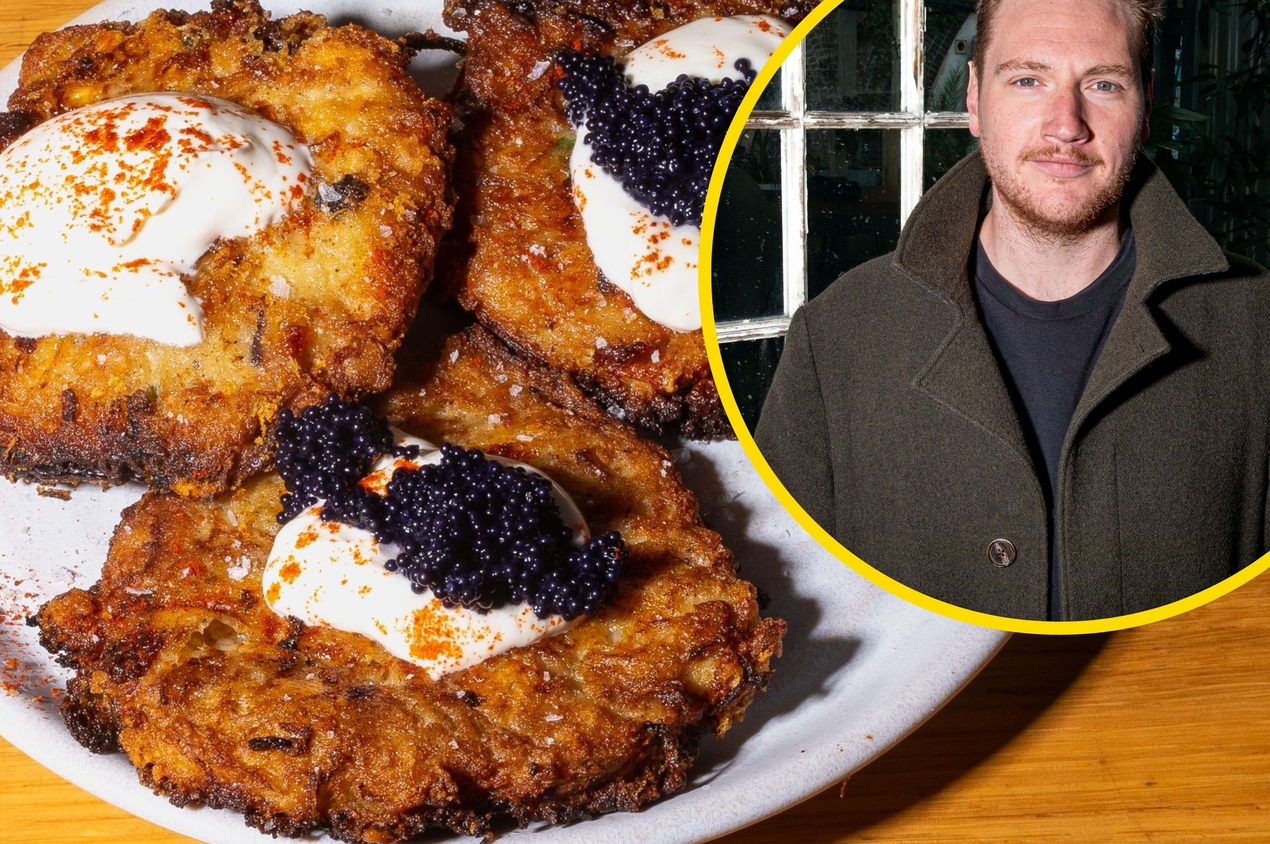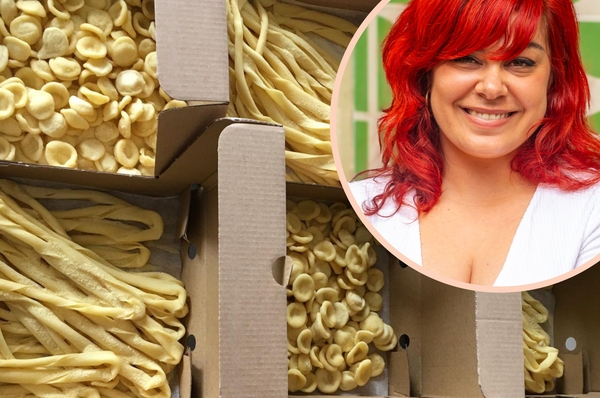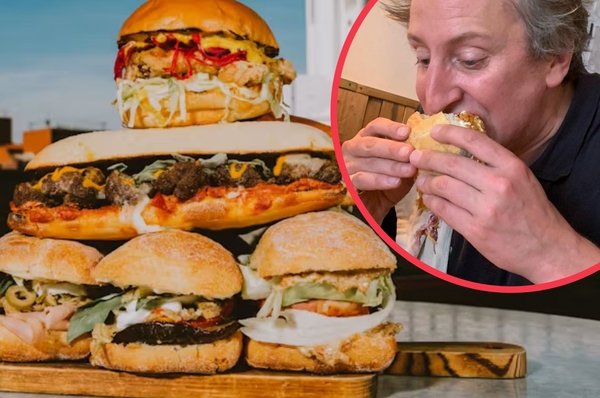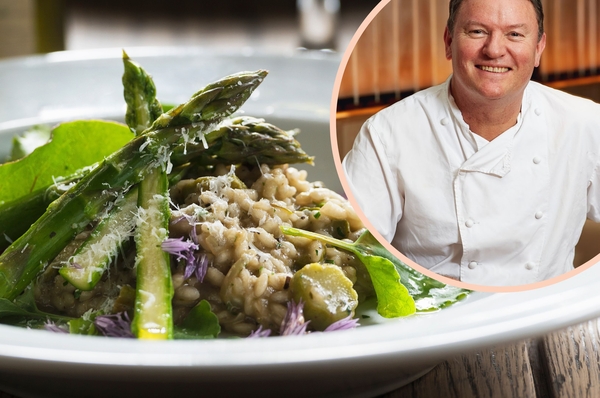Interview
Time's Table with Wilde's Deli - sachertorte, fajitas and tzimmes
30 Nov 2023
8m

Every now and then a meal becomes more than just a meal. It could be innovative and exciting – the kind that shapes your cooking going forward – but there’s something equally magic about the dish your mum used to cook you growing up, or even the reliable weekly staple you knock together on repeat.
In this new series, Time’s Table, we chat to people about the food that has left an impact on a time in their life – be it their past, present or future. Trust us, you can learn a lot about someone through what’s on their plate.
It’s hard to find a gap in the market in London’s food scene, but Ollie Gratter has done just that. His pop-up concept, Wilde’s Deli, celebrates Jewish food through a somewhat trendier lens than the city often affords it – elevating the traditional favourites beloved in local hotspots and catapulting them into the epicentre of the food scene.
Having spent his childhood in north London, Ollie is well acquainted with the very best salt beef, bagels, and smoked salmon that the city has to offer, and grew up eating traditional Jewish food on the reg. But over time, he realised the foods he had always loved weren’t often celebrated beyond his own community.
Yes, everyone knows that famous bagel shop on Brick Lane, but what about the contemporary Jewish spots you’d see in New York? The next generation putting a twist on the classics?
 Ollie is the brain's behind Jewish deli pop-up concept, Wilde's (Credit: Twisted)
Ollie is the brain's behind Jewish deli pop-up concept, Wilde's (Credit: Twisted)
Serving the city everything from challah french toast to latkes with caviar via recipe kits, supper clubs, and pop-ups, home cook Ollie launched Wilde’s last summer, and has since proven that Jewish grub deserves a spot at the big boys’ table.
But what are the three dishes that have shaped his cooking and made him the man for the job? We asked Ollie about a meal from his past, a present staple, and recent discovery that’ll shape his future cooking, to get a better idea of the man behind the matzo meal.
Past - Grandma’s sachertorte
“I've never been religious, but I've always been around Jewish food, either at friends’ houses or at home, but especially around my dad's parents," says Ollie.
“They were both immigrants to the UK during the Second World War. My grandma came from Vienna, originally via Prague, and we think my grandpa was from Poland, but due to borders, it at some point has also been Russia and Ukraine.
“When I was with them, we ate everything from cholent (a traditional Jewish grain and meat stew), challah (plaited Jewish bread), rye bread, and a lot of pickled things.
 Ollie takes inspiration from the pickled foods he grew up with (Credit: Instagram: Wilde's Deli)
Ollie takes inspiration from the pickled foods he grew up with (Credit: Instagram: Wilde's Deli)
“Culturally, this is the food that my ancestors lived on, so there's a massive element of nostalgia there. I feel a huge amount of affinity and connection to the culture – and food is the number one reason. It is for a lot of people, right?
“Anyone that's ever immigrated anywhere has ingratiated themselves within the local community via their food. I'm not the immigrant, but I'm only third generation, and given how under-represented Jewish food is, that’s still so important.
“The most nostalgic dish for me is my grandma's sachertorte, straight out of Austria. I guess it's Jewish in the sense that she's a Jew from Vienna. It feels like a connection to that part of my heritage.
“Sachertorte is essentially a two-layered chocolate cake made from very dark chocolate – 70 percent plus. It's got a thin layer of apricot jam running through the middle, and then the whole thing is covered with a kind of shiny chocolate curvature ganache that’s almost like a mirror when you look into it.
 Sachertorte is a nostalgic dish for Ollie (Credit: Getty)
Sachertorte is a nostalgic dish for Ollie (Credit: Getty)
“As a child, I think the only chocolate I'd eaten was milk chocolate. So to suddenly have this rich, dark, and ganache-y type cake… it just blew my mind.
“Now, if I ever eat anything from a patisserie, especially if it’s from central or eastern Europe, it just makes me think of [my grandma].
“It’s something that I had a lot when I was a small child, then not for a few years, once my grandparents passed away. Then my mum learned to recreate it very well.
“My uncle has just told me that in the last few weeks he's found [my grandma’s] handwritten recipe book. This was written in the 30s and it's all in German, but he's going to give it to me and I can start using her authentic, original recipe.
“I'd probably still put my twist in it. I’ve made my own bastardised version of it before, turning it into a type of sundae.
“[The flavours are] just very, very rich and beautiful. All I think of when I eat is my grandma and my mum, so it’s very sentimental to me.”
 Ollie has fond memories of his grandmother's sachertorte (Credit: Getty)
Ollie has fond memories of his grandmother's sachertorte (Credit: Getty)
Present - Slow-cooked chicken fajitas
“I would say my cooking style at home is relaxed and takes f**king ages, basically.
“I really enjoy cooking things that take a long time or all day to cook. Things that you kind of need to keep checking in on throughout the day. That’s more because of the feeling it gives me.
“For me, food is a pleasure. It's not just fuel, and I think that extends to the cooking process.
“An example would be, I made some really, really nice fajitas a few weeks ago where I poached the chicken in this sauce that I was making from scratch and then shredded it back into the sauce.
“There was a whole process of adding garlic and onions, peppers and crushed tomatoes later, and just cooking it down and down and down, adding spices as time went on.
 Ollie unwinds by slow cooking when he's at home (Credit: Getty)
Ollie unwinds by slow cooking when he's at home (Credit: Getty)
“It's not the most ‘cheffy’ meal in the world, but it's really warming and comforting and it's a nice wintry home dish to be making.
“What you end up with is this really thick, meaty, stewy type thing. Spoon that into a tortilla and eat it as a fajita and it’s a great meal…but it takes a long time – hours.
“I think that my love of slow cooking has come from wanting to enjoy the process whilst in the kitchen.
“Often when you're cooking for lots of other people [like during pop-ups and supper clubs], you've got times to hit and people are expecting food within a certain few minutes of ordering.
“So, when I'm cooking at home, I tend to really slow down and just get into the zone – it's quite cathartic and relaxing for me.
“I enjoy being by myself and I tend not to even have music on. It's very ASMR. All you can hear is things bubbling away in the background or even the chopping, sometimes.
“It almost makes the sitting down and eating part more enjoyable knowing the work you've put into it.
“And the serving to others…I probably get too much pleasure from watching other people eat food that I've cooked. It's a bit weird.
“It's less from an ego perspective and more about just getting people around the table and having an excuse to bring people together. I know it sounds a bit wanky, probably, but it's true.
“I guess growing up with Friday night dinners showed me [the importance of that] – quite aside from the religious side of things.
“[A lot of Jewish socialising] is centred around a meal.”
Future - Gertrude’s tzimmes
“There's some really interesting stuff happening in New York in particular at the moment, where for a long time you've had all the traditional Jewish delis – your Katz’s and things like that.
“What I'm starting to see now is a couple of third-generation people starting out restaurants that are ‘Jew-ish’ – and that's very much how I would describe myself as well.
“It's taking aspects of Jewish food – flavours, ingredients, cooking techniques – whatever they are, and combining them with ones from other cuisines…bringing it up to date and contemporising it.
“I've not actually been out to the States since I started Wilde’s, so I haven't tried them firsthand, but I do know that there are two restaurants, Gertrude’s and Gertie – they’re both part of the same group.
 Tzimmes is a traditional Jewish dish which is getting revamped in NYC (Credit: Getty)
Tzimmes is a traditional Jewish dish which is getting revamped in NYC (Credit: Getty)
“[They’ve taken] a traditional side dish called in Jewish cuisine called tzimmes (it's traditionally root veg cooked down with a sweet fruit like dates, in a sweet broth) and they’ve done it with exotic citrus fruits instead – so, blood oranges, things like that.
“I think they're using various types of root veg rather than just the traditional sweet potato that you might normally use, too.
“It’s an example of taking something quite traditional and old school and just going, ‘Okay, well how do we modernise it using ingredients that are a bit more exciting or appealing?’
“They fit the bill flavour-wise but are not the types of things you would've found at your grandma's table 16 years ago!
“That massively shapes what I'm doing now and how I want to do things in the future.
“I think one of the problems that Jewish cuisine suffers from is that it's got quite an old-school image, at least in this country.
 Gertie in New York is a restaurant inspiring Ollie with its modern tzimmes (Credit: Instagram: GertieNYC)
Gertie in New York is a restaurant inspiring Ollie with its modern tzimmes (Credit: Instagram: GertieNYC)
“In New York, most people have tried knishes, lox bagels, and pastrami Reubens, but in London, it tends to be that you've got smaller outfits that are designed to serve the Jewish communities that literally surround them.
“So I really want to modernise it – not just the setting it's served in, the whole thing – be that making the food more accessible for people that have never had it before or have tried it occasionally.
“Wilde’s has got a lot more attention a lot quicker than I could ever have dreamed of, and I think that speaks partially to what I was just saying about there just not being enough of this ‘kind-of-Jewish’ food in London
“Jewish people have told me it’s scratched an itch, but most of the feedback I've got has been from people that aren't Jewish, and some are like, ‘yeah, I've never had this food ever before and it's great, and why isn't there more of this stuff?’
“Either way, I'm really pleased to be able to either introduce – or reintroduce – this type of food to a lot of people.”
Featured image credit: Twisted


